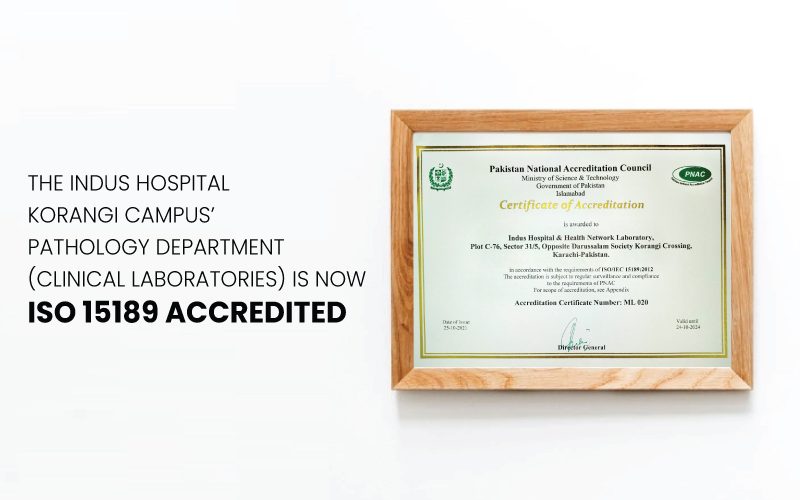THE INDUS HOSPITAL, KORANGI CAMPUS’ PATHOLOGY DEPARTMENT ACHIEVES ISO 15189 ACCREDITATION THE INDUS HOSPITAL, KORANGI CAMPUS’ PATHOLOGY DEPARTMENT ACHIEVES ISO 15189 ACCREDITATION
The Pathology Department (clinical Laboratories) of Indus Hospital, Karachi, received accreditation with ISO 15189 quality standards, becoming one of the 14 medical laboratories in Pakistan to achieve this status.
The role of clinical laboratories in the treatment of patients cannot be overstated, as timely and accurate diagnostic reports are the ultimate foundation of optimal patient management. The quality and efficiency of clinical laboratory services is thus paramount to the eventual treatment outcomes of patients.
Indus Hospital & Health Network’s (IHHN) scope of diagnostic services accredited with ISO 15189 is the largest amongst all of the ISO accredited clinical laboratories within Pakistan. The milestone is a culmination of several years of effort to progressively align the quality of diagnostic services at IHHN with international standards.
Before this accreditation, IHHN had already achieved other indicators of quality in diagnostic services including proficiency testing by College of American Pathologists and Australian RCPAQAP (quality assurance program), and equipment calibration from ISO 17025 accredited organizations.
While ISO 15189 accreditation of clinical laboratories at The Indus Hospital, Karachi, is an important milestone, it is still one landmark in the process to continually improve quality and expand the scope of services to meet the ultimate aim of the organization – to bring free of charge, the best possible healthcare to the people of Pakistan.
ISO 15189
ISO (International Standards Organization) is an independent, non-governmental international organization with the mandate to develop international standards for organizations of all kinds. Specifically, for clinical laboratories, the organization has developed a set of quality standards called ISO 15189. Accreditation with these standards is voluntary, but nevertheless a certification that a clinical laboratory is meeting a set of international quality standards for clinical laboratories adds to the credibility of the institution. To date, only 14 clinical laboratories in Pakistan have been accredited in accordance with ISO15189 standards)




